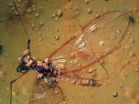(Press-News.org) Crows fed on prion-infected brains from mice can transmit these infectious agents in their feces and may play a role in the geographic spread of diseases caused by prions, such as chronic wasting disease or scrapie. The new research published Oct. 17 in the open access journal PLOS ONE by Kurt VerCauteren from the US Department of Agriculture (USDA) and other colleagues, shows that prions can pass through crows' digestive systems without being destroyed, and may be excreted intact after ingestion by the birds. According to the authors, their results demonstrate a potential role for the common crow in the spread of infectious diseases caused by prions.
Prions are infectious proteins that cause diseases in humans and other animals. Studies so far have suggested that insects, poultry and scavengers like crows may be passive carriers of infectious prions, but this is the first demonstration that prions can retain their ability to cause disease after passing through the avian digestive system.
The authors fed crows with brain samples from mice infected with prions, and found that the crows passed infectious prions up to 4 hours after eating the infected samples. When healthy mice were injected with the infected crow excretions, all the mice showed signs of prion disease. The authors state that their results support the possibility that crows that encounter infected carcasses or consume infected tissue may have the capacity to transport infectious prions to new locations.
###
Citation: VerCauteren KC, Pilon JL, Nash PB, Phillips GE, Fischer JW (2012) Prion Remains Infectious after Passage through Digestive System of American Crows (Corvus brachyrhynchos). PLoS ONE 7(10): e45774. doi:10.1371/journal.pone.0045774
Financial Disclosure: Funding was provided by U.S. Department of Agriculture, Animal and Plant Health Inspection Service, Veterinary Services (VS). A representative of VS served on a panel that provided input to the 5-year plan for the Chronic Wasting Disease Project of the National Wildlife Research Center, within which this project was conducted. The funders had no role in study design, data collection and analysis, decision to publish, or preparation of the manuscript.
Competing Interest Statement: The authors have declared that no competing interests exist.
PLEASE LINK TO THE SCIENTIFIC ARTICLE IN ONLINE VERSIONS OF YOUR REPORT (URL goes live after the embargo ends):
http://dx.plos.org/10.1371/journal.pone.0045774
Crows don't digest prions, may transport them to other locations
Prions remain infectious after passage through the digestive system of crows
2012-10-18
ELSE PRESS RELEASES FROM THIS DATE:
Planet found in nearest star system to Earth
2012-10-18
European astronomers have discovered a planet with about the mass of the Earth orbiting a star in the Alpha Centauri system — the nearest to Earth. It is also the lightest exoplanet ever discovered around a star like the Sun. The planet was detected using the HARPS instrument on the 3.6-metre telescope at ESO's La Silla Observatory in Chile. The results will appear online in the journal Nature on 17 October 2012.
Alpha Centauri is one of the brightest stars in the southern skies and is the nearest stellar system to our Solar System -- only 4.3 light-years away. It is ...
Women whose first pregnancy was ectopic have fewer children
2012-10-18
Women whose first pregnancy is ectopic are likely to have fewer children in the following 20-30 years than women whose first pregnancy ends in a delivery, miscarriage or abortion, according to results from a study of nearly 3,000 women in Denmark. In addition, these women have a five-fold increased risk of a subsequent ectopic pregnancy.
The first study to look at long-term reproductive outcomes in women whose first pregnancy was ectopic is published online today (Thursday) in Europe's leading reproductive medicine journal Human Reproduction [1].
Ectopic pregnancies ...
Association between rare neuromuscular disorder and loss of smell, Penn Study finds
2012-10-18
PHILADELPHIA - Changes in the ability to smell and taste can be caused by a simple cold or upper respiratory tract infection, but they may also be among the first signs of neurodegenerative disorders such as Alzheimer's disease and Parkinson's disease. Now, new research from the Perelman School of Medicine at the University of Pennsylvania has revealed an association between an impaired sense of smell and myasthenia gravis (MG), a chronic autoimmune neuromuscular disease characterized by fluctuating fatigue and muscle weakness. The findings are published in the latest edition ...
Men bearing brunt of worsening mental health in England since start of 2008 recession
2012-10-18
Men have borne the brunt of worsening mental health across the population of England since the start of the economic downturn in 2008, reveals research published in the online journal BMJ Open.
But unemployment and a falling household income don't seem to be the culprits, prompting the authors to suggest that it is the threat of losing their jobs that has affected men's mental health.
They base their findings on data taken from the national representative annual Health Survey for England for adults aged 25 to 64, between 1991 and 2010.
Response rates during this ...
Gastric band surgery has big impact on heart disease and stroke risk factors
2012-10-18
Bariatric surgery—restrictive gastric banding and other types of gastric bypass—can radically reduce risk factors for heart disease and stroke, and within a short period of time, indicates an analysis of the available evidence, published online in Heart.
The impact is much greater and faster than drug treatments for weight management or diabetes, say the authors, and in some cases, could be life-saving.
Being obese or overweight kills more than 2.6 million people every year. And the evidence shows that excess body fat produces harmful chemicals and skews gut hormones ...
LSU research team shows negative impact of nutrients on coastal ecosystems
2012-10-18
BATON ROUGE – LSU's John Fleeger, professor emeritus in LSU's Department of Biological Sciences, is part of a multi-disciplinary national research group that recently discovered the impact of nutrient enrichment on salt marsh ecosystems is marsh loss and that such loss is seen much faster than previously thought. Globally between a quarter and half of the area of the world's tidal marshes has already been lost, and although multiple factors – sea-level rise, development, loss of sediment supply – are known to contribute to marsh loss, in some locations the causes have remained ...
Massive planetary collision may have zapped key elements from moon
2012-10-18
Fresh examinations of lunar rocks gathered by Apollo mission astronauts have yielded new insights about the moon's chemical makeup as well as clues about the giant impacts that may have shaped the early beginnings of Earth and the moon.
Geochemist James Day of Scripps Institution of Oceanography at UC San Diego and colleagues Randal Paniello and Frédéric Moynier at Washington University in St. Louis used advanced technological instrumentation to probe the chemical signatures of moon rocks obtained during four lunar missions and meteorites collected from the Antarctic. ...
Barley genome could hold key to better beer
2012-10-18
An international consortium of scientists has published a high resolution draft of the barley genome. The research, published in the journal Nature, will help to produce new and better barley varieties that are vital for the beer and whisky industries.
The UK team behind the research was led by Professor Robbie Waugh of Scotland's James Hutton Institute who worked with researchers at The Genome Analysis Centre, Norwich.
Barley is the second most important crop in UK agriculture and malting barley underpins brewing and pub industries worth some £20 billion to the UK ...
Steps in the right direction for conservation
2012-10-18
As the climate changes, conservationists are divided over the most effective way to preserve animal and plant diversity because they cannot simply preserve the status quo. Ensuring species can shift to track the climate to which they are suited is a complex problem, especially when there are competing demands on land use. A simple prediction is that more habitat would help species to shift, but it is not obvious what the best spatial locations for habitat would be.
A new study led by scientists at the University of York says that well placed habitat "stepping stones" would ...
16 million-year-old amber specimen reveals unknown animal behaviors
2012-10-18
Stunning images, including video footage, from a CT scan of amber have revealed the first evidence of any creature using an adult mayfly for transport.
Researchers at the University of Manchester say this 16 million-year-old hitchhiker most likely demonstrates activity that is taking place today but has never previously been recorded.
Entombed in amber the tiny springtail can be seen resting in a v-shaped depression at the base of one of the mayfly's wings. It appears to have secured itself for transport using its prehensile antennae.
Dr David Penney and colleagues ...
LAST 30 PRESS RELEASES:
Cost of copper must rise double to meet basic copper needs
A gel for wounds that won’t heal
Iron, carbon, and the art of toxic cleanup
Organic soil amendments work together to help sandy soils hold water longer, study finds
Hidden carbon in mangrove soils may play a larger role in climate regulation than previously thought
Weight-loss wonder pills prompt scrutiny of key ingredient
Nonprofit leader Diane Dodge to receive 2026 Penn Nursing Renfield Foundation Award for Global Women’s Health
Maternal smoking during pregnancy may be linked to higher blood pressure in children, NIH study finds
New Lund model aims to shorten the path to life-saving cell and gene therapies
Researchers create ultra-stretchable, liquid-repellent materials via laser ablation
Combining AI with OCT shows potential for detecting lipid-rich plaques in coronary arteries
SeaCast revolutionizes Mediterranean Sea forecasting with AI-powered speed and accuracy
JMIR Publications’ JMIR Bioinformatics and Biotechnology invites submissions on Bridging Data, AI, and Innovation to Transform Health
Honey bees navigate more precisely than previously thought
Air pollution may directly contribute to Alzheimer’s disease
Study finds early imaging after pediatric UTIs may do more harm than good
UC San Diego Health joins national research for maternal-fetal care
New biomarker predicts chemotherapy response in triple-negative breast cancer
Treatment algorithms featured in Brain Trauma Foundation’s update of guidelines for care of patients with penetrating traumatic brain injury
Over 40% of musicians experience tinnitus; hearing loss and hyperacusis also significantly elevated
Artificial intelligence predicts colorectal cancer risk in ulcerative colitis patients
Mayo Clinic installs first magnetic nanoparticle hyperthermia system for cancer research in the US
Calibr-Skaggs and Kainomyx launch collaboration to pioneer novel malaria treatments
JAX-NYSCF Collaborative and GSK announce collaboration to advance translational models for neurodegenerative disease research
Classifying pediatric brain tumors by liquid biopsy using artificial intelligence
Insilico Medicine initiates AI driven collaboration with leading global cancer center to identify novel targets for gastroesophageal cancers
Immunotherapy plus chemotherapy before surgery shows promise for pancreatic cancer
A “smart fluid” you can reconfigure with temperature
New research suggests myopia is driven by how we use our eyes indoors
Scientists develop first-of-its-kind antibody to block Epstein Barr virus
[Press-News.org] Crows don't digest prions, may transport them to other locationsPrions remain infectious after passage through the digestive system of crows

